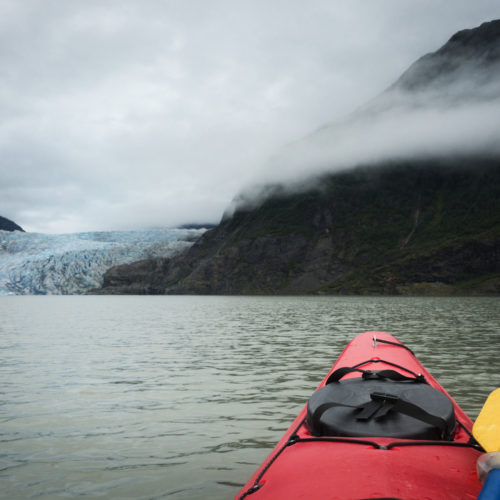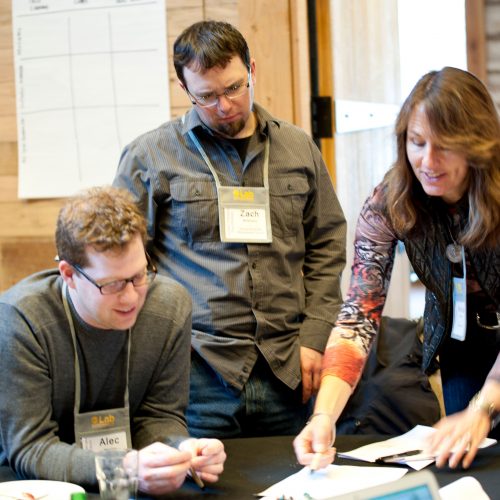
eLab Accelerator 2018
Juneau Renewable Heating
Kayaker pauses to admire the blue ice on Mendenhall Glacier while traveling across the lake in a red kayak on a misty, cloudy overcast day, Juneau, Alaska, USA

Project Objective
Our team intends to outline the strategic path that allows Juneau to serve its thermal energy requirements from renewable sources.

Team Members
- Susan Bell, Principal, McDowell Group
- Bob Deering, Renewable Energy Coordinator-Alaska Region, USFS
- Lori Hermanson, Senior Business Analyst-Data Science, Avista Utilities
- Alec Mesdag, Vice President and Director of Energy Services, Alaska Electric Light and Power Co.
- Aaron Morrison, Senior Mechanical Engineer, PDC Engineers
- Lori Sowa, Project Engineer-Engineering and Public Works, City and Borough of Juneau
- Alan Wilson, Vice Chair-Board of Directors, Alaska Housing Finance Corporation
Project Description
Juneau, Alaska, receives greater than 99% of its electricity from low-impact hydro generation, but greater than 80% of the thermal loads in Juneau are served by petroleum. The hydro resources exist to offset this petroleum usage, but the path forward remains poorly defined due to the complexity of timing when new loads come online, generating action from building owners, maintaining standby generation, and paying for it all. Our project seeks to identify the innovative business models, technology solutions, and partnerships necessary to create a scalable model for replacing the use of petroleum for thermal loads.
Progress Made to Date
Finding alternatives to heating oil is an ongoing community interest that every member of the team has engaged with directly or indirectly as an individual. The City and Borough of Juneau Assembly recently adopted a goal to serve 80% of Juneau’s energy usage from renewable sources by 2045, and the community and region have previously explored a number of strategies for replacing petroleum for space heating.
Project Background Information
- Southeast Alaska Integrated Resource Plan ("SEIRP" at following link): http://www.akenergyauthority.org/Policy/RegionalPlanning
- Juneau Renewable Energy Strategy: http://www.juneau.org/sustainability/energy_plan.php
- Air Source Heat Pumps in Southeast Alaska: http://www.cchrc.org/sites/default/files/docs/ASHP_final_0.pdf
- AELP presentation on infrastructure planning for a CBJ energy forum in 2016: https://drive.google.com/open?id=1lbLqkLMwnk9yNkP06KeK1HSv0BP2WUwb
- JEDC Renewable Energy Cluster Working Group: http://www.jedc.org/southeast-cluster-initiative-renewable-energy
- "Short-Term Electricity Conservation in Juneau, Alaska: A Study of Household Activities": https://aceee.org/files/proceedings/2010/data/papers/2131.pdf
Post-Accelerator outcomes
At Accelerator, the team more clearly mapped the technical, social and financial challenges associated with a large-scale shift away from petroleum fuels for thermal loads. The team recognized that the magnitude of financial impact will vary greatly with the sequence of implemented measures. For example, replacing electric resistance heat with heat pumps first makes energy available for subsequent oil to heat pump conversions with minimal impacts on existing infrastructure. With that in mind, the team focused on identifying how to build support and momentum, exploring how to shift individual decision making towards solutions that benefit the community as a whole. The team identified short-, medium-, and long-term goals for the initiative, focusing on the specific actions needed and the stakeholders and financial resources that could provide support. The team left the event with an action plan based on recruiting specific champions and partners, continuing to flesh out the roadmap to achieving Juneau's 2045 renewable energy goal, and building awareness in the community.